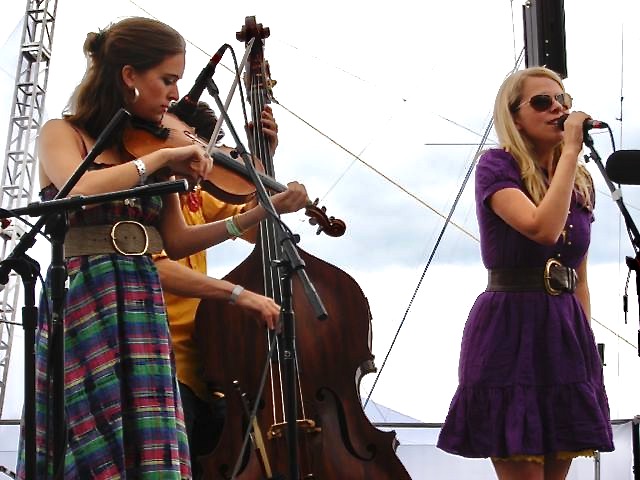
Brittany Haas, left, and Aoife O’Donovan of Crooked Still; bassist Corey Dimario is obscured. -Gary Whitehouse
I was unprepared for my interview with members of Crooked Still. By that I mean that I was unprepared for how genuinely nice these young musicians were. Friendly and accommodating in the middle of a busy weekend of music, in the midst of a hectic and seemingly never-ending touring schedule; and they were also passionate and thoughtful about music in general and their own music in particular.
In short, they were a joy to interview, even though a group interview has never been my favorite. It’s just hard to talk intelligently with three or four people at once, while taking notes with pen and paper. But we gave it a go, thanks to the diligence of Megan McNair at Lotos Nile, gathering backstage after a well-received set that included a rare for Pickathon encore.
The main questions I had on my mind were: What accounts for the popularity of acoustic Americana among young people? And how did they themselves come to be making this music?
I talked with Aoife O’Donovan, who sings and plays acoustic guitar; Corey Dimario, bass and backing vocals; Greg Liszt, banjo and backing vocals; and Brittany Haas, fiddle, although Haas deferred to the other three; she and cellist Tristan Clarridge, who was elsewhere, are still relative newcomers to the group.
Dimario and O’Donovan met at music school (the New England Conservatory), and if I got the story straight, at some point played in a klezmer band together. When barely out of her teens, she was a member of the Wayfaring Strangers, an early jazz-bluegrass supergroup of sorts led by fiddler Matt Glaser and including Andy Statman and Tony Trischka. Liszt was active in the music scene in Boston, as was Rushad Eggleston, the group’s original cellist. Those four, who formed the original group, met at a party at the home of Lissa Schneckenburger (herself a fine and popular Celtic fiddler who is now married to Dimario).
“Aoife got us together as a band for a class project,” Dimario said.
Liszt said all of the members had wide-ranging taste in music. “I know I went through all the phases, the punk phase, the rap phase, all of that,” he said. “We try to assimilate all kinds of styles, whether it’s jazz or bluegrass or thrash-jam rock, and not try to emulate them so much, but rather incorporate them into what we’re doing, which is American string band music of all kinds.”
“Everybody in the band has listened to all kinds of music — plainsong, hip-hop, jazz, whatever,” Dimario said.
Listen to Crooked Still, particularly their latest release Still Crooked and see how they have their own trademark style which reflects all of those interests and styles, but isn’t dominated by any one of them, and also doesn’t change from song to song.
“The repertoire keeps it grounded, so we don’t go all over the map with all the different styles,” Dimario explained. Some string bands will fill an album or a gig with songs in different styles — one bluegrass, one a rock jam, one jazzy, one old-time. “Our repertoire is American stringband music of all kinds, whether it’s bluegrass or Robert Johnson blues or gospel or whatever.”
O’Donovan said she “didn’t get into American folk music” until relatively late in her musical development. “I grew up with various kinds of folk music; my father was a stalwart in the Boston Irish music scene.” In fact, Brian O’Donovan is host of a long-running Celtic music program on public radio in Boston.
“People are attracted to it because it makes you feel good,” O’Donovan said. “It spurs a wide range of emotions — I just really love it.”
“It’s less processed and commercialized,” said Dimario. “Most of the music that ends up on the typical radio station is very processed and people stop feeling connected to it.”
Said Liszt: “We also fit into this growing segment of talented players who are working to elevate the level of the playing of acoustic music as an art form.” He named some of the usual suspects such as Darol Anger, Bela Fleck and Jerry Douglas. He also had nothing but praise for Eggleston, who he said “revitalized the whole cello world.”
“Musicians like that have created a lot more options for those of our generation who are coming into the music in their wake,” Liszt said. “So that if we want to incorporate rock energy or classical techniques or play a jazz standard, it’s OK and accepted.”
The world of acoustic music is “very inclusive,” O’Donovan said. Darol Anger, who was also performing at this year’s Pickathon, was sitting nearby and had earlier been chatting with the band. My interview subjects got a big kick out of my suggestion that their hanging around backstage with someone like Anger would be like a kid in a garage band hanging out with Mick Jagger. “He is the Mick Jagger of the acoustic music world,” O’Donovan said with a laugh.
Seriously, though, she said “In the world of acoustic folk music, there are very few barriers, between the musicians and fans or between the generations of musicians.”
With that, I let the members of Crooked Still go to prepare for their next set in the festival’s Galaxy Barn. I hope I get many more chances to hear them play in the future.
August 2, 2008 (Pickathon, Happy Valley, Oregon)
